| Prince Bertil | |||||
|---|---|---|---|---|---|
| Duke of Halland | |||||
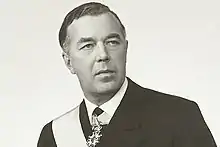 Bertil in 1964 | |||||
| Born | 28 February 1912 Stockholm Palace, Stockholm, Sweden | ||||
| Died | 5 January 1997 (aged 84) Villa Solbacken, Djurgården, Stockholm, Sweden | ||||
| Burial | 13 January 1997 Royal Cemetery, Solna, Sweden | ||||
| Spouse | |||||
| |||||
| House | Bernadotte | ||||
| Father | Gustaf VI Adolf | ||||
| Mother | Margaret of Connaught | ||||
| Religion | Church of Sweden | ||||
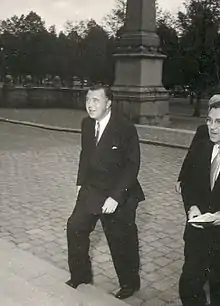
Prince Bertil, Duke of Halland (Bertil Gustaf Oskar Carl Eugén; 28 February 1912 – 5 January 1997), was a member of the Swedish royal family. He was the third son of King Gustaf VI Adolf and his first wife, Princess Margaret of Connaught, as well as the uncle of King Carl XVI Gustaf of Sweden, Queen Margrethe II of Denmark and Queen Anne-Marie of Greece. From 1973 to 1979 he was heir presumptive to his nephew King Carl XVI Gustaf and the Swedish throne.
Early life
Bertil was born 28 February 1912 at Stockholm, as the fourth of five children born to Princess Margaret of Connaught and Crown Prince Gustaf Adolf of Sweden. His siblings included: Prince Gustaf Adolf, Duke of Vasterbotten, Prince Sigvard, Duke of Uppland, Princess Ingrid and Prince Carl Johan, Duke of Dalarna.
The family lived in apartments at Stockholm Palace in Stockholm, at Ulriksdal Palace near the capital in Ulriksdal and at the summer residence: Sofiero Palace in Helsingborg in the southernmost province of Sweden, Scania.[1]
Royal role
Bertil was granted a very old dukedom, one that was bestowed in the Middle Ages on various Danish and Swedish royal relatives, such as Benedict, Duke of Halland. After his eldest brother, Prince Gustaf Adolf, died in 1947, leaving an infant son, Prince Carl Gustaf, in the line of succession, and because his elder brother Sigvard had already given up his place in the succession (owing to a constitutionally unacceptable marriage), it seemed likely that Bertil could one day become regent. After Carl Gustaf became king, Bertil remained the next in line to the throne (until the birth of Prince Carl Philip in 1979), and continued to act as the King's deputy.
When the Act of Succession was changed in 1980, rights to the throne were restricted to Carl XVI Gustaf and his descendants; however, a special addendum was made for Bertil's case, so that he became third (and, after the birth of Princess Madeleine in 1982, fourth) in line to the throne.
Personal life
Bertil became a naval officer; and, during the Second World War, he served as Swedish naval attaché at the embassy in London.
In 1943, Bertil met his long-term partner, Welsh commoner Lilian Craig. However, in order to preserve his place in the royal succession, Bertil and Lilian did not marry for decades. They lived together discreetly, as a fully private arrangement, from the 1940s until their marriage was announced and took place in 1976. Their common base was a home in Sainte-Maxime, in the south of France.[2]
Since his life with Craig was not official, Prince Bertil's single status meant he was suggested as a match for, among others, Princess Margaret of the United Kingdom.[3] After the death of Gustaf VI Adolf in 1973, the new king, Carl XVI Gustaf, married a non-royal woman and approved the marriage of Bertil and Lilian, which took place at Drottningholm Palace on 7 December 1976.
Bertil was fond of cars, owning a rare Aston Martin DB2[4] and a Chevrolet Corvette.[5] Volvo asked him to open the Volvo Halifax Assembly plant in 1963 in Nova Scotia, Canada. A parking garage in Sainte-Maxime is named after him. The ex-HRH Prince Bertil of Sweden also owned a 1926 Bugatti Type 35 Grand Prix [6] A copy of its original Swedish registration document starting in the name of HRH Prince Bertil in 1939.
Prince Bertil was a keen supporter and practitioner of various sports, notably tennis and boules. In 1947, he was elected Chairman of both the Swedish Sports Confederation and Sweden's Olympic Committee. He was also a member of the fine-dining society La Chaine des Rotisseurs.
He died at his home the Villa Solbacken in Stockholm in 1997, with Princess Lilian at his side. Their grave is at the Royal Cemetery in Haga Park.
Military ranks
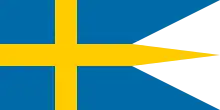 4 October 1934: Acting sub-lieutenant
4 October 1934: Acting sub-lieutenant 1936: Underlöjtnant
1936: Underlöjtnant 1937: Sub-lieutenant
1937: Sub-lieutenant 13 February 1942: Lieutenant
13 February 1942: Lieutenant 1 April 1948: Lieutenant commander
1 April 1948: Lieutenant commander ????: Commander
????: Commander 1952: Captain
1952: Captain 1956: Rear admiral
1956: Rear admiral 1956: Major general in the Army[7]
1956: Major general in the Army[7] 1956: Major general in the Air Force[7]
1956: Major general in the Air Force[7] 17 October 1969: Admiral[8]
17 October 1969: Admiral[8] 17 October 1969: General in the Army[8]
17 October 1969: General in the Army[8] 17 October 1969: General in the Air Force[8]
17 October 1969: General in the Air Force[8]
Honours
National honours
 Knight of the Royal Order of the Seraphim (1912)[9]
Knight of the Royal Order of the Seraphim (1912)[9] Commander Grand Cross of the Order of the Sword (1912)
Commander Grand Cross of the Order of the Sword (1912) Commander Grand Cross of the Order of the Polar Star (1912)
Commander Grand Cross of the Order of the Polar Star (1912) Knight of the Order of Charles XIII (1912)
Knight of the Order of Charles XIII (1912) Commander Grand Cross of the Order of Vasa (28 February 1952)[10]
Commander Grand Cross of the Order of Vasa (28 February 1952)[10] Recipient of the King Gustaf V's Jubilee Commemorative Medal (1948)
Recipient of the King Gustaf V's Jubilee Commemorative Medal (1948) Recipient of the King Gustaf V's Jubilee Commemorative Medal (1948)
Recipient of the King Gustaf V's Jubilee Commemorative Medal (1948) Recipient of the King Gustaf VI Adolf's Commemorative Medal (1967)
Recipient of the King Gustaf VI Adolf's Commemorative Medal (1967) Recipient of the Illis quorum in gold of 18th size with chain (1969)
Recipient of the Illis quorum in gold of 18th size with chain (1969) Recipient of the H. M. The King's Medal, 12th size gold medal with diamonds worn around the neck on a chain of gold (silver-gilt) (1987)
Recipient of the H. M. The King's Medal, 12th size gold medal with diamonds worn around the neck on a chain of gold (silver-gilt) (1987) Recipient of the King Carl XVI Gustaf's Jubilee Commemorative Medal I (1996)
Recipient of the King Carl XVI Gustaf's Jubilee Commemorative Medal I (1996)
Foreign honours
 Argentina: Grand Cross of the Order of the Liberator General San Martín[11]
Argentina: Grand Cross of the Order of the Liberator General San Martín[11].svg.png.webp) Belgium: Grand Cordon of the Order of Leopold[12]
Belgium: Grand Cordon of the Order of Leopold[12] Chile:
Chile:
- Grand Cross of the Order of Merit[13]
- Grand Cross of the Order of Bernardo O'Higgins[14]
 Colombia: Grand Cross of the Order of Boyaca[13]
Colombia: Grand Cross of the Order of Boyaca[13] Denmark: Knight of the Order of the Elephant[12]
Denmark: Knight of the Order of the Elephant[12].svg.png.webp) Egypt: Grand Cross of the Order of Muhammad Ali[12]
Egypt: Grand Cross of the Order of Muhammad Ali[12] Estonia: First Class of the Order of the Cross of Terra Mariana[11]
Estonia: First Class of the Order of the Cross of Terra Mariana[11].svg.png.webp) Ethiopia:
Ethiopia:
- Grand Cross of the Order of Solomon[14]
- Grand Cross of the Order of Menelik II[12]
 Finland: Grand Cross of the Order of the White Rose of Finland[13]
Finland: Grand Cross of the Order of the White Rose of Finland[13] France: Grand Cross of the Legion of Honour[12]
France: Grand Cross of the Legion of Honour[12] Germany: Grand Cross 1st class of the Order of Merit of the Federal Republic of Germany[11]
Germany: Grand Cross 1st class of the Order of Merit of the Federal Republic of Germany[11].svg.png.webp) Iraq: First Class of the Order of the Two Rivers[12]
Iraq: First Class of the Order of the Two Rivers[12]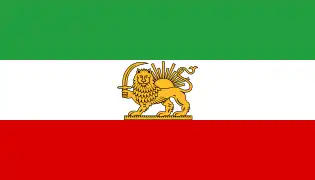 Iran:
Iran:
- Second Class of the Order of Pahlavi[11]
- Knight Grand Cordon of the Order of the Crown[12]
 Iceland: Grand Cross of the Order of the Falcon[14]
Iceland: Grand Cross of the Order of the Falcon[14] Italy: Knight Grand Cross of the Order of Merit of the Italian Republic[11]
Italy: Knight Grand Cross of the Order of Merit of the Italian Republic[11] Japan: Grand Cordon of the Order of the Chrysanthemum[11]
Japan: Grand Cordon of the Order of the Chrysanthemum[11] Mexico: Grand Cross of the Order of the Aztec Eagle[11]
Mexico: Grand Cross of the Order of the Aztec Eagle[11] Netherlands: Knight Grand Cross of the Order of the Netherlands Lion[11]
Netherlands: Knight Grand Cross of the Order of the Netherlands Lion[11] Norway:
Norway:
- Grand Cross with Collar of the Order of St. Olav (23 March 1953)[15]
- Grand Cross of the Order of St. Olav (1 March 1952)[15]
 Peru: Grand Cross of the Order of the Sun of Peru[13]
Peru: Grand Cross of the Order of the Sun of Peru[13] Portugal: Grand Cross of the Order of Christ[11]
Portugal: Grand Cross of the Order of Christ[11].svg.png.webp) Saxe-Coburg-Gotha: Grand Cross of the Saxe-Ernestine House Order[12]
Saxe-Coburg-Gotha: Grand Cross of the Saxe-Ernestine House Order[12].svg.png.webp) Spain: Grand Cross of the Order of Charles III[11]
Spain: Grand Cross of the Order of Charles III[11] Thailand: Knight of the Order of the Royal House of Chakri (21 September 1960)[16]
Thailand: Knight of the Order of the Royal House of Chakri (21 September 1960)[16] United Kingdom: Honorary Knight Grand Cross of the Order of the Bath (June 1956)[17]
United Kingdom: Honorary Knight Grand Cross of the Order of the Bath (June 1956)[17] United States: Commander of the Legion of Merit (4 June 1948)
United States: Commander of the Legion of Merit (4 June 1948) Venezuela: Grand Cordon of the Order of the Liberator[13]
Venezuela: Grand Cordon of the Order of the Liberator[13].svg.png.webp) Yugoslavia: Recipient of the Order of the Yugoslav Great Star (29 March 1976)[18]
Yugoslavia: Recipient of the Order of the Yugoslav Great Star (29 March 1976)[18]
Arms
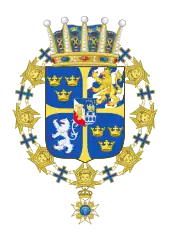
On his creation as Duke of Halland, Prince Bertil was granted use of a coat of arms based on the Arms of Dominion of Sweden, with the arms of Halland in the third quarter.
Ancestry
| Ancestors of Prince Bertil, Duke of Halland |
|---|
References
- ↑ "Queen Ingrid of Denmark". Daily Telegraph. 8 November 2000.
- ↑ "HRH Princess Lilian of Sweden". Daily Telegraph. 10 March 2013.
- ↑ "H R H The Princess Margaret". Daily Telegraph.
- ↑ "Originally the property of HRH Prince Bertil of Sweden 1952 Aston Martin DB2 Drophead Coupé". Bonhams.
- ↑ "Restoring HRH Prince Bertil of Sweden's Corvette". GM Heritage.
- ↑ "Originally the property of HRH Prince Bertil of Sweden". William I’Anson Ltd.
- 1 2 Sveriges statskalender för skottåret 1964 (in Swedish). Uppsala: Fritzes offentliga publikationer. 1964. p. 349.
- 1 2 3 Hård af Segerstad, Pia, ed. (1969-10-18). "Dag för dag". Svenska Dagbladet (in Swedish). p. 13. Retrieved 2 October 2023.
- ↑ Nordenvall, Per (1998). Kungliga Serafimerorden: 1748-1998 (in Swedish). Stockholm: Kungl. Maj:ts orden. pp. 58, 444. ISBN 9163067447. SELIBR 8364835.
- ↑ Sveriges statskalender för året 1955 (in Swedish). Stockholm: Fritzes offentliga publikationer. 1955. p. 127.
- 1 2 3 4 5 6 7 8 9 10 "Besök på ordenssalarna". www.phaleristica.com (in Swedish). 8 June 2016. Retrieved 18 September 2019.
- 1 2 3 4 5 6 7 8 Sveriges statskalender för skottåret 1940 (in Swedish). Uppsala: Fritzes offentliga publikationer. 1940. p. 5.
- 1 2 3 4 5 Sveriges statskalender för året 1950 (in Swedish). Stockholm: Fritzes offentliga publikationer. 1950. p. 5.
- 1 2 3 Sveriges statskalender för året 1955 (in Swedish). Stockholm: Fritzes offentliga publikationer. 1955. p. 5.
- 1 2 "Tildelinger av ordener og medaljer" [Awards of medals and medals]. www.kongehuset.no (in Norwegian). Royal Court of Norway. Retrieved 2022-02-17.
- ↑ "แจ้งความสำนักนายกรัฐมนตรี เรื่อง พระราชทานเครื่องราชอิสริยาภรณ์" (PDF). Royal Thai Government Gazette (in Thai). 28 December 1960. Archived from the original (PDF) on 5 April 2015. Retrieved 2019-05-08.
- ↑ "Många ordnar utdelade vid drottningbesöket" [Many orders awarded at the Queen's visit]. Svenska Dagbladet (in Swedish). 9 June 1956. p. A13. Retrieved 26 October 2022.
- ↑ "Visit of Sweden and official dinner". Retrieved 16 December 2020.
External links
 Media related to Prince Bertil, Duke of Halland at Wikimedia Commons
Media related to Prince Bertil, Duke of Halland at Wikimedia Commons
